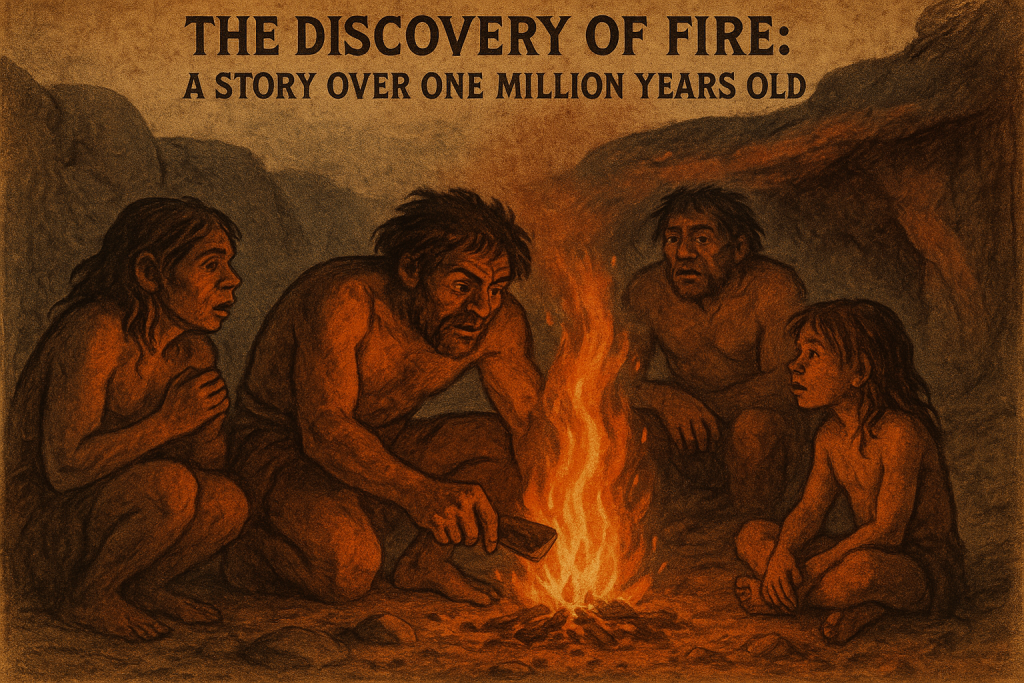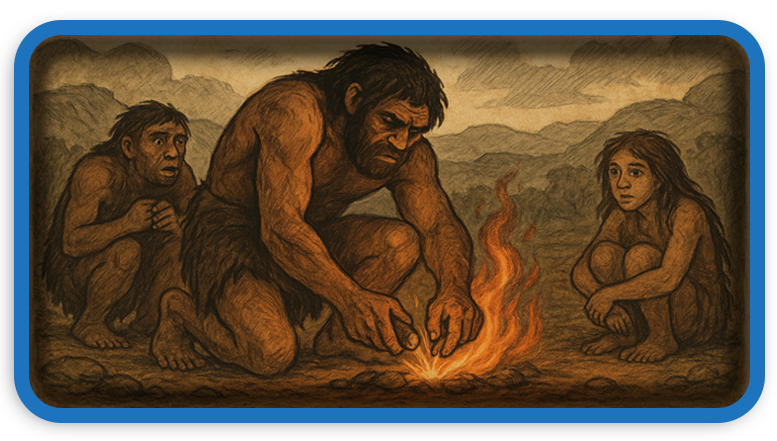⏲️ Estimated reading time: 5 min
🔥 The Discovery of Fire: How a Spark Ignited Human Civilization
The discovery and control of fire marked a pivotal moment in human history. This simple yet powerful natural element fueled survival, progress, and the foundation of civilization forever changing the course of humanity.
🔥 Why Fire Was a Turning Point
The discovery of fire stands as one of the most important milestones in human history. It transformed the lives of early humans, enabling them to survive, thrive, and evolve. Long before the dawn of Homo sapiens, our ancient ancestors began harnessing the power of fire an act that would eventually ignite the flames of civilization.
🌋 Natural Fire vs. Human-Made Fire
Fire has existed on Earth for millions of years, caused by natural events like lightning strikes and volcanic eruptions. These phenomena created wildfires that scorched the landscape, long before any human presence.
However, the true revolution began when early humans not only used fire but learned to control and produce it. This shift allowed them to adapt to new environments, prepare food, and build complex societies.
🧠 Who Discovered Fire First?
Archaeological evidence suggests that Homo erectus, a species predating modern humans, may have been the first to use fire deliberately. Sites such as Wonderwerk Cave in South Africa have revealed ash layers and charred bones dating back nearly 1 million years.
These findings indicate controlled fire usage not accidental burning showing a conscious effort to maintain and benefit from fire.
🔥 How Early Humans Used Fire
1. Warmth and Survival
Fire provided crucial heat in cold climates, enabling humans to migrate to cooler regions. This adaptation allowed for population growth and the spread of human species across continents.
2. Protection from Predators
The sight and smell of fire deterred wild animals. Campfires became safety zones at night, giving humans a strategic advantage in the wild.
3. Cooking and Nutrition
Cooking transformed human diets. Heating food:
- Made meat and plants easier to chew and digest
- Killed harmful bacteria and parasites
- Increased nutritional value
These benefits led to better health, energy efficiency, and brain development.
4. Lighting the Night
Firelight extended the day. For the first time, early humans could:
- Gather and talk after sunset
- Plan, bond, and teach
- Begin the evolution of language and storytelling
🔧 Learning to Create Fire
Early humans likely began by collecting embers from natural fires. Eventually, they developed methods to ignite fire themselves:
- Friction: Rubbing sticks together to generate heat
- Percussion: Striking flint stones to create sparks
These breakthroughs allowed humans to carry fire, light new fires at will, and adapt quickly to new environments.

👥 Fire as a Social Catalyst
Beyond physical needs, fire played a central role in community and culture.
Around the Campfire
Groups would gather around flames to:
- Share food
- Pass down stories
- Teach survival skills
This daily ritual strengthened social bonds, fostering cooperation and collective memory vital for tribal unity and growth.
Tool Development
Fire aided in early tool-making:
- Hardening wooden spear tips
- Heating and shaping stones
Later, fire would enable metal smelting, paving the way for the Bronze and Iron Ages, and opening doors to advanced civilizations.
🔥 Fire in Ancient Myths and Beliefs
Fire’s influence extended into spiritual and symbolic realms. In nearly every ancient culture, fire was revered:
- 🔱 In Greek mythology, Prometheus stole fire from the gods to empower humanity.
- 🔥 In Hinduism, Agni is the god of fire, representing purification and transformation.
- 🌅 In many tribal cultures, fire rituals honored ancestors and connected communities to the divine.
These stories reflect the awe and reverence ancient people had for fire’s power and mystery.
⚙️ The Lasting Legacy of Fire
The control of fire was a turning point in evolution. It:
- Accelerated brain development
- Revolutionized diets and health
- Expanded geographic reach
- Strengthened communities
- Enabled technological progress
Even today, fire remains foundational:
- In homes (cooking, heating)
- In industry (welding, power generation)
- In science (combustion, space travel)
While modern technology relies more on electricity and digital innovation, the spark that started it all still fuels our world literally and metaphorically.
🔎 Reflection: What Fire Tells Us About Ourselves
The story of fire is more than just a tale of survival it’s a symbol of human ingenuity, adaptability, and vision. From taming nature to building cities, fire laid the groundwork for nearly every leap forward in history.
Understanding this journey deepens our appreciation for how this discovery became a pillar of civilization. Fire isn’t just a tool it’s a testament to who we are and how far we’ve come.
🧭 Embers of Progress
Fire’s role in human evolution cannot be overstated. It turned darkness into light, raw into cooked, isolation into community. From ancient caves to modern cities, the legacy of fire burns on reminding us that even the smallest spark can shape the future.
🔔 For more tutorials like this, consider subscribing to our blog.
📩 Do you have questions or suggestions? Leave a comment or contact us!
🏷️ Tags: fire history, discovery of fire, human evolution, early humans, Homo erectus, archaeology, fire in mythology, survival skills, prehistoric technology, fire symbolism
📢 Hashtags: #FireDiscovery, #EarlyHumans, #HumanEvolution, #ArchaeologyFacts, #AncientTechnology, #HistoryOfFire, #PrehistoricLife, #HomoErectus, #SurvivalTools, #CulturalOrigins
🔚 The Flame of Origins
The journey from accidental wildfire to controlled campfire marks one of the greatest transformations in human history. The discovery of fire allowed us to cook, to gather, to create and ultimately, to build civilizations. Every time we strike a match or light a stove, we echo the footsteps of our ancestors who first tamed the flame.
Let it remind us: even the humblest invention can ignite a revolution.
Only logged-in users can submit reports.
Discover more from HelpZone
Subscribe to get the latest posts sent to your email.

